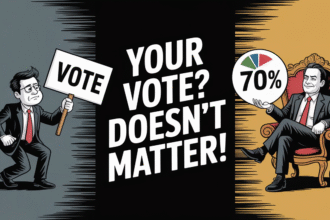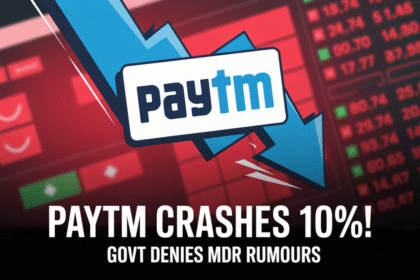Written By: Nishant Parsad
Imagine this: You buy a share in a company. You’re excited. After all, owning a share means you’re now a part-owner — at least in theory. You’ve got skin in the game, your money is riding on the company’s performance, and with it comes a fundamental right — the right to vote.
Yes, vote.
Just like in a democracy, shareholders get to vote on major decisions — from choosing board members to approving acquisitions, executive pay packages, or related-party deals.
But here’s the uncomfortable truth:
Even if you do vote… even if you shout your opinion through that vote — it often doesn’t matter.
And the ones not listening?
The very people running the company: the promoters.
So, What Do You Even Vote On?
Before we get into why your vote is ignored, let’s clear up what shareholders can vote on.
When you hold shares, you’re legally allowed to vote on matters like:
– Appointing or removing directors
– Approving salaries, bonuses, and ESOPs for top executives
– Mergers, acquisitions, or demergers
– Related Party Transactions (RPTs) — like when a promoter’s relative is getting a contract
– Issuing new shares, diluting equity, or raising capital
These aren’t small decisions.
They define a company’s future.
But here’s where it gets tricky — not all votes are counted equally, and not all resolutions need the same level of support.
Not All Resolutions Are Created Equal
Every proposal that goes to shareholders is called a resolution, and there are three major types — each with its own approval threshold:
| Type | Approval Needed | Examples |
| Ordinary Resolution | >50% of votes in favour | Appointing directors, CEO salary hike |
| Special Resolution | >75% of votes in favour | Name changes, raising funds via QIP |
| Majority-of-Minority | >50% of non-promoter votes | Related party deals, selling a subsidiary |
Sounds fair? On paper, yes.
But here’s where things start tilting…
How Votes Are Actually Counted
Let’s say a company has 100 shareholders. A resolution is passed if 75% of the votes cast support it.
So, what happens if only 60 shareholders show up to vote?
Then only 45 approvals are needed (75% of 60), not 75 out of 100.
It’s not based on total ownership. It’s based on who shows up to vote.
Now imagine this in the real world where most retail shareholders never vote.
Who does?
Promoters.
The Real Power Dynamic: Who Owns, Who Votes
According to the IiAS 2025 report on Nifty 500 companies:
- Promoters hold ~51% of the total shares
- Institutional investors (like mutual funds, FIIs) hold ~27%
- Retail & public investors hold ~22%
Now let’s look at voting participation:
- Promoters: vote in 79% of resolutions
- Institutions: also ~79%
- Retail investors? Just 19%
So, while public shareholders may own a sizable chunk, they’re mostly silent.
Meanwhile, promoters not only own a majority — they consistently vote.
What Happens as a Result?
Out of 4,840 resolutions put to vote in 2024, a stunning 99.5% were approved.
Only 24 got rejected.
Now here’s the shocker:
Even when nearly half of institutional investors opposed a proposal — it still passed.
Take two examples from the IiAS data:
• At Adani Ports, 46.91% of institutional shareholders voted against a compensation-related proposal
• At Persistent Systems, 45.26% voted against a similar resolution
Still, both were approved.
Why?
Because when promoters vote in bulk, and retail investors don’t participate, it doesn’t matter how institutions feel. The math is already stacked.
So… Why Don’t Promoters Care?
Because they don’t have to.
They own more than half the company.
They show up to vote.
And most retail shareholders — like you and me — don’t.
Even if every mutual fund or FII says “No,” promoters have enough votes to say “Yes” — and win.
This is why shareholder opposition rarely matters.
Because one side is loud. And the other side? Mostly absent.
Can this Be Fixed?
Actually, yes.
The IiAS has proposed a simple, fair solution:
A Shareholder Dissent Review Mechanism.
Here’s how it works:
If 10% or more shareholders vote against a resolution (even if it technically passes), the board is forced to respond.
They must:
1. Engage with dissenting shareholders
2. Explain why the decision was taken
3. Take corrective action if needed
4. And publish a formal response within 4 months
This mechanism won’t stop the resolution, but it does something equally important:
It forces transparency.
Inspired by the Indian Constitution
This idea is actually modeled on a principle from the Indian Constitution — where the President can send a bill back to Parliament for reconsideration.
The Parliament may still pass the bill later, but at least it must re-evaluate the decision and publicly justify it.
That’s the goal here too:
To build accountability, spark dialogue, and rebuild trust with shareholders.
Final Thoughts
Your vote should matter.
But in the current setup, it often doesn’t — because of low participation and high promoter control.
The good news?
The conversation is changing. Mechanisms like the Shareholder Dissent Review could be the first step toward empowering small investors and holding promoters more accountable.
But until then —
The question isn’t just “Why don’t promoters care about your vote?”
It’s also “Why don’t more shareholders use it?”
The silence, after all, is what makes indifference easy.







